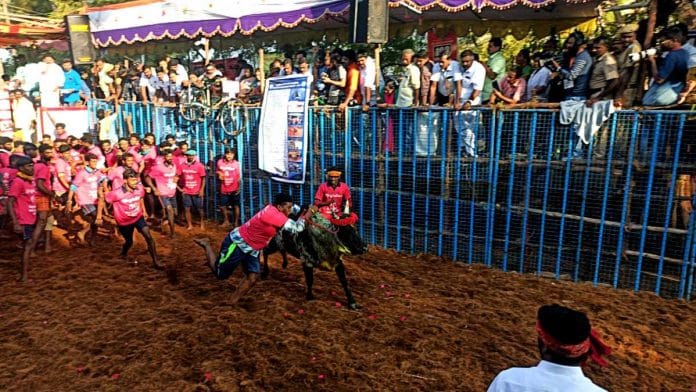New Delhi: A five-judge bench of the Supreme Court Thursday reserved its judgment on a bunch of petitions seeking to strike down a Tamil Nadu law that protects Jallikattu, a popular bull-taming sport, by claiming that it is a cultural heritage of the state and protected under Article 29 (1) of the Constitution.
The sport was banned by the Supreme Court in 2014. In its detailed report before the apex court, animal-rights group PETA India, which is one of the petitioners, said at least 23 bulls and 86 humans have died, while 6,351 people suffered injuries, ever since Jallikattu was legalised by the Tamil Nadu government in 2017.
The petitions were filed by the Animal Welfare Board of India, PETA India, Compassion Unlimited Plus Action, Animal Equality and Federation of Indian Animal Protection Organisations.
“Bulls were viciously hit, whipped with ropes, and jabbed with nail-tipped wooden sticks. Participants also bit the animals’ tails, which they twisted, yanked, and broke, in order to provoke them,” PETA said as part of its investigation into the sport.
The sport is traditionally played around the Pongal festival, in mid-January. The report submitted by PETA India covered seven Jallikattu incidents, including three erudhu vidum vizha (bull race) that took place in the Tamil Nadu districts of Coimbatore, Krishnagiri, Madurai, and Vellore between 14 January and 31 January this year.
Also read: ‘Vaccines: Injecting Hope’ — science exhibition narrates story of India’s Covid journey
‘Flouting rules’
The Tamil Nadu PCA (Conduct of Jallikattu) Rules, 2017, outlines several rules for the sport, which PETA claims have been flouted.
One of these rules states that the sport needs to be conducted in open grounds, but the PETA India report highlighted that in some districts, the competition was held inside villages, town centres, streets or narrow by-lanes.
Another rule outlines that the bulls should be provided a minimum rest period of 20 minutes before being brought into the arena, and should be given adequate space of 60 square feet when waiting in their enclosures.
But the PETA India report claims that not only were the bulls made to stand for 16 hours to wait their turn, they were also squeezed in queues without being provided any food or water.
The PETA investigators also noted that many bulls entering the arena had injuries and mutilations like cut ears or bleeding nostrils.
‘Not following Covid guidelines’
The PETA India report also claims that organisers and competitors disregarded Covid-19 norms and limitations established by the Tamil Nadu government for Jallikattu.
According to the PETA India report, more than 300 people registered at some of these competitions, and at the erudhu vidum vizha events the spectator galleries were filled to capacity rather than the 50 per cent norm as allowed by the state government.
Senior advocate Siddharth Luthra, who argued on behalf of the petitioners, said there was no evidence to support Jallikattu’s cultural legitimacy and made references to how customs like sati, dowry, and child marriage were formerly accepted as aspects of Indian culture until outlawed by legislation.
But the top court said, “Just because death occurs, it doesn’t mean that it is a blood sport. We do not think anybody going there to embrace a bull wishes to see blood. They use no weapons. People are mounting the bull with bare hands.”
The Tamil Nadu government informed the SC that none of the PETA-produced documents could be answered because they were not included in the court record.
Earlier this year, one spectator died at the hands of a bull, while 80 others were injured. In 2020, five people died and over 100 were injured over three days of the events in various districts.
Also read: PETA India urges Rajya Sabha MPs to revise Wildlife Bill, prohibit ‘ownership’ of elephants






